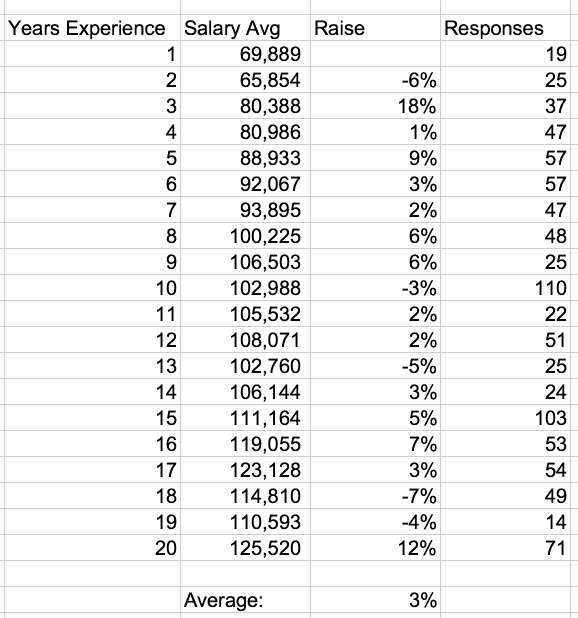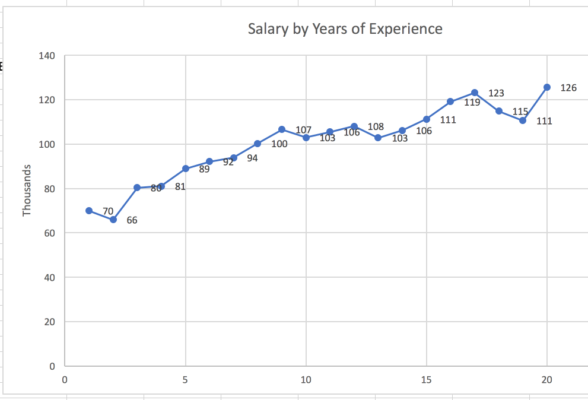I took the data from the 2017 Data Professional Salary Survey, and filtered just for database administrators in the United States. Then, I pivoted it on the two experience questions. First, we’ll cover database experience, and then we’ll cover job experience.
How many years of experience do you have with this database?
I stopped the analysis at 20 years of experience because the numbers drop dramatically at that point. (Makes sense, SQL Server 7 wasn’t even out 20 years ago.)

Each year of database experience seems to correlate with about a 3% raise. Sure, some of the years represent a drop, but the overall trend is positive over time:

However, here’s the tricky part: just because you’ve been gaining database experience doesn’t mean you’ve held the same job over time.
For example, going back through my own career, there were definite jumps up in my salary – but they corresponded with times where I changed my job position. Going from jack-of-all-trades to developer: big bump. Going from developer to DBA: another big bump. Which leads us to…
How many years of experience do you have with this type of job?
This tells a very different story:

For your first few years as a DBA, you probably shouldn’t expect much in the way of a raise. There are bumps along the way, though:

My hunch: you don’t get a big bump for the first couple/few years because you tend to stick with the same company. You end up getting bored (or ambitious) after a few years, and then you jump to another company as a DBA – and that’s where the raise comes in, about five years in.


9 Comments. Leave new
Hunch confirmed. Started as a Jr. DBA, but getting paid tech support wages since it was more of an apprenticeship style position. After about 5 years I realized I was a legit DBA and could be getting paid waaay more elsewhere.
I’m not sure I’d say that is confirmed. Might just be confirmation bias.
Glad to know it works both ways. Company puts you out because they want cheaper. You jump ship because you want more. You should always go where you are valued.
Not sure I agree. I worked 7 years for a single company out of college and tripled my salary during that time. I’ve never left a position for more money, always because I’ve grown bored with the company, people, tech.
There’s a bit of a cognitive bias here…you are conflating “duration” with “experience”. The two aren’t the same. There are those with 10 years of experience…and those with 1 year of experience repeated 10 times.
I work with people who have been in my job longer than I’m alive and I wouldn’t trust them as a jr DBA…and I’ve worked with interns who have schooled me.
Said differently, if “time served” was the only criterion for advancement/salary, then every 30 yr military vet would retire on a general or gunnery sargeant. The world don’t work that way. The Peter Principle sums this up nicely…paraphrasing…you rise to your level of incompetence, and no further.
Dave – the numbers in the survey don’t seem to support people tripling their salary over time (especially in just 7 years of time). Granted, these are snapshots, and it’s entirely possible that the 7-year-experience people making $93k today might have been making $31k in 2009, but….yeah.
I do appreciate where you’re coming from, but I think you might be a bit of an outlier.
The conclusions you reach seem to match my experience. When I was in between jobs for a while and getting somewhat concerned about my prospects, I took a $10k pay cut from my previous salary to get into a SQL Server DBA job despite having mainly Oracle PL/SQL development skills when it comes to database work (it’s amazing that they hired me). I did get raises over time, but very small ones. After 4 years, I moved to a new employer as a SQL Server DBA for a $15k raise from my pay at that time. I’ve been at this job for 3 years now, getting about 3% increases per year and am angling for a promotion in the next year, or I may just have to start looking around again. But money won’t be the main reason.
Are these salaries based in major cities? It seems really scary that 1 year experience DBA in the States earns more than a DBA in the UK with 10 years experience! Typical “Senior DBA” positions in the UK are going for around £45,000 to £55,000 which equates to $60,000-$73,000 US!
Starting salaries are closer to £25,000!
Only when you start to look at London do you find the bigger salaries, and those are quite few and far between.
Yeah, from what I’ve seen, DBA salaries are way lower in the UK than in the US. On the flip side, in the UK, you have these really long contracts or employment agreements so your jobs are absurdly safe – whereas in the US, you can be dropped at a moment’s notice (or quit at a moment’s notice.)
Yeah, I wish I understood American labour laws. I always fancied moving to the States, but I just worry about all the stories you hear. (People refusing to take annual leave for fear of losing their jobs as they appear to be “slacking” and so on).
Maybe Canada is a happy compromise?